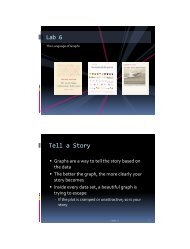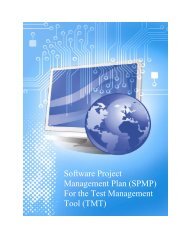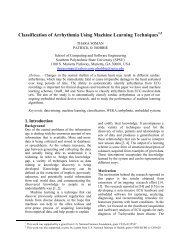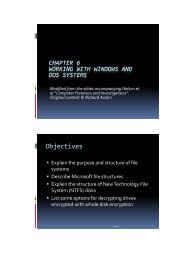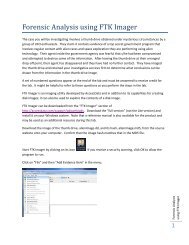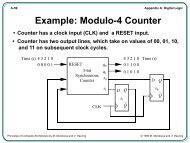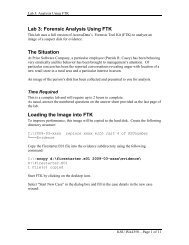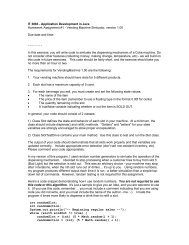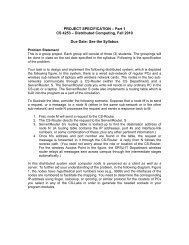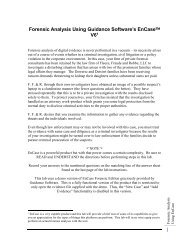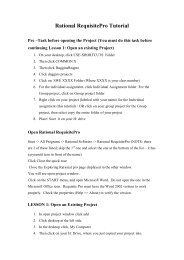You also want an ePaper? Increase the reach of your titles
YUMPU automatically turns print PDFs into web optimized ePapers that Google loves.
DRAFT, February 18, 2003, Page 109<br />
%TRANSPORT - JDK jdpa (debug interface) transport appropriate to current OS. his is dt_shmem if<br />
available, dt_socket if dt_shmem is not available, and the first transport found otherwise.<br />
%CLASSIC_OPT - "-classic" on systems where the latest JDK ships with a classic VM, otherwise the<br />
empty string.<br />
%PACKAGE - (Java) full package name.<br />
%CLASS - (Java) full package/class name.<br />
%class - (Java) class name.<br />
%PACKAGE_PATH - (Java) path to package root. Java "Run as Applet" only.<br />
%HTML_FILE - (Java) full path to temporary html file.<br />
%html_file - (Java) temporary html file name.<br />
%EXTENSION_PATH - path to jGRASP extensions directory. This was set during installation on<br />
Windows, by a JGRASP_EXTENSIONS environment variable, or -e flag at startup.<br />
%D - begins and ends a part of the command that is only used when compiler debug mode is on.<br />
%N - begins and ends a part of the command that is only used when compiler debug mode is off.<br />
%EY - turn on input echo. This is the default mode. In this mode, input in the Run I/O window remains<br />
visible after it is entered.<br />
%EN - turn off input echo. In this mode, input in the Run I/O window disappears after it is entered. This is<br />
useful if the target process will echo input, or if the input should not be seen in the output stream.<br />
%CP - turn on pipe connection mode for a command (Windows only). This is the default mode. In this<br />
mode, input and output to the target process will be through pipes.<br />
%CD - turn on DOS window mode for a command (Windows only). If on, the target process will always<br />
run in a DOS window.<br />
%CY - use Cygwin wedge for a command (Windows/Cygwin only). If on, the target process will be called<br />
from a Cygwin-aware native wedge program. This should eliminate output buffering problems for Cygwin<br />
applications. This wedge can not be used for non-Cygwin executables, or if you have an old version of<br />
Cygwin. For old versions of Cygwin, you will likely get an error message stating that "Cygwin1.dll" is<br />
missing, in which case you need to use a different connection mode. You might have the same problem<br />
with a new version of Cygwin if your PATH is messed up (possibly because you have multiple versions of<br />
Cygwin installed), or because the Cygwin mounts are messed up.<br />
%CC - turn on console connection mode for a command (Windows only). If on, input to the target process<br />
will be through a console, while output is through pipes. This can eliminate I/O buffering problems seen<br />
when input is through a pipe. It does fix buffering problems on executables compiled with cygnus gcc and<br />
g++. On VC++ and Borland bcc compiled executables, it makes buffering worse (fully buffered instead of<br />
line buffered output). It will cause some jvms to crash.<br />
%CX - turn on debug connection mode for a command (Windows NT only). This mode has not been<br />
thoroughly tested, it may have problems. If on, the target will run as a debug process in Windows NT, and<br />
console functions will be intercepted to collect output. This will make the run I/O window behave more like<br />
a console. An actual console which echoes I/O will pop up, initially iconified. This window can be used to<br />
enter escape sequences, etc. This mode will not work for processes that move the cursor around in the<br />
console. You will most commonly also need %EN to avoid a double input echo, in which case input and<br />
output will not be colored differently.<br />
%V1 - variable specified in environment.<br />
%V2 - variable specified in environment.




